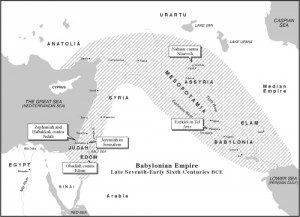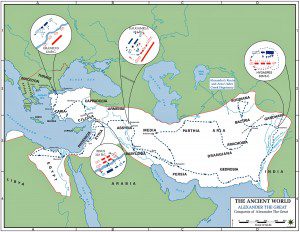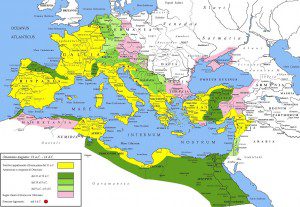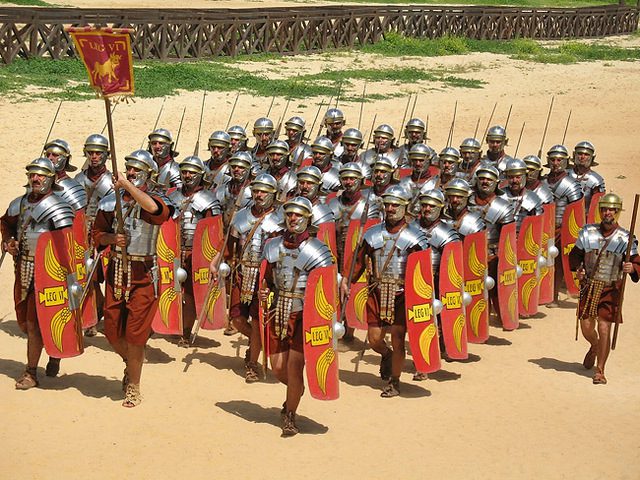Jesus, Son of Man, comes among us with a perspective of history of another dimension we can scarcely comprehend: time.
I am the Alpha and the Omega, the beginning and the end.
Before Abraham was, I AM.
Remarkable statements! A perspective of history which can only be viewed outside of our dimension of time.
Never-the-less, let us view some of the maps of the nations (gentiles) over the times preceding the incarnation of the Son of Man.
 Israel has fallen. God has pronounced judgment on Israel for her unfaithfulness. God sends his Prophets to unfaithful Judah (her sister of whoredom) and to the gentile nations as well.
Israel has fallen. God has pronounced judgment on Israel for her unfaithfulness. God sends his Prophets to unfaithful Judah (her sister of whoredom) and to the gentile nations as well.
Judah is small. Assyria, Babylonia, Mesopotamia, Syria and Egypt are large and powerful, opposing each other with God giving victory to varied enemies of Judah in the times of the Prophets and the times of His silence before a newer map at a later time.
 In the fourth century B.C. comes another conqueror from the west: Alexander the Great. He defeats the eastern empires and spreads Greek culture throughout the Mediterranean. The map again differs and the language and culture from the time after Alexander’s death is called Hellenism. Greek becomes the common language of the empire, including Jerusalem and the former areas of defeated Israel and fallen Judah (now called Phoenicia). Don’t think of it as small Greece, islands of the Mediterranean, but Empire Greece, as in Asia (or most of what we now call Asia) as far as India in the East.
In the fourth century B.C. comes another conqueror from the west: Alexander the Great. He defeats the eastern empires and spreads Greek culture throughout the Mediterranean. The map again differs and the language and culture from the time after Alexander’s death is called Hellenism. Greek becomes the common language of the empire, including Jerusalem and the former areas of defeated Israel and fallen Judah (now called Phoenicia). Don’t think of it as small Greece, islands of the Mediterranean, but Empire Greece, as in Asia (or most of what we now call Asia) as far as India in the East.
Now, much nearer the time of Jesus, 62 B.c.- 14 A.D., we read of the Incarnate Son of God in Luke 2. (No doubt all are familiar with the story, yet few are familiar with the map.)
The Birth of Jesus Christ
2 In those days a decree went out from Caesar Augustus that all the world should be registered. 2 This was the first registration when Quirinius was governor of Syria. 3 And all went to be registered, each to his own town. 4 And Joseph also went up from Galilee, from the town of Nazareth, to Judea, to the city of David, which is called Bethlehem, because he was of the house and lineage of David, 5 to be registered with Mary, his betrothed, who was with child.
 Again in our timeline under Rome, again we must view the map not as a place of Israel or Judah. Rome conquered Jerusalem, Tyre and Sidon (of Syria), Nazareth and all the rest. The map is of Rome and every town in every land is a crossroads that leads to Rome.
Again in our timeline under Rome, again we must view the map not as a place of Israel or Judah. Rome conquered Jerusalem, Tyre and Sidon (of Syria), Nazareth and all the rest. The map is of Rome and every town in every land is a crossroads that leads to Rome.
Judea is nothing more than a minor province in a key expansion of Rome, extending south from Tyre and Damascus beyond Jerusalem. The military control of Rome over the conquered provinces involves an infusion of Roman military control and government and taxes, along with the sharing of a common culture of Hellenistic roots in the Greek language and culture.
The power of Rome is not its politics or religion, but it’s army. The success of Rome is due, in part, to the integration of a common language (Greek) and culture with the local customs and religions and trade (including taxes to pay the army, administrative costs of Rome). Pay your taxes and keep your local customs.
The religions of the gentiles of Rome, the gentiles of Greece, and the gentiles of the conquering Babylonians, and other conquering nations like Assyria and Egypt have one thing in common: many gods. The “god of the current time” is often the current ruler, a Pharaoh, a Caesar or worshiped human king. The Asians worship idols. The Greeks and Romans worship idols. Only the Jews have One God and no idols.
This same Caesar Augustus of Luke 2 had (for political reasons) declared himself a god. Later, the local Jewish politicians seek to draw Jesus into this controversial debate.
Want to start a controversy among lovers of Greek mythology (yes, myths as origins of various gods and the ways they serve man)? Just ask how many. Answer? Thousands!
And Rome cared more for her power and politics than culture. However Rome’s idols and gods also explained which gods served man in which ways. How many? Again, a countless number of gods to serve the Roman citizen and the slaves of Roman rule.
Another fact of Roman life overlooked is that the population of Rome had many slaves It was the culture, discipline organization and administration of the Roman army that best modeled any success of Rome. A conquered people in the days of Jesus, like in the days of the Prophets, could be taken away from their cities and towns and homes to any foreign town or province and sold as slaves. The Roman army used this as leverage to have local leaders do as they wanted under a local administration of Rome.
Into this environment comes the family of the Herod’s who chose their sides with the right Roman generals and were rewarded for their efforts.
(Why all this background? NEXT we continue with Jesus’ early encounters with Romans in His travels…)

